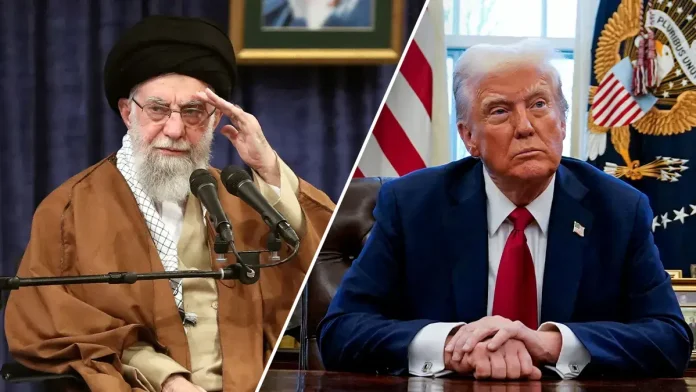On June 27, 2025, former U.S. President Donald Trump ignited a global firestorm with a Truth Social post claiming he saved Iran’s Supreme Leader Ayatollah Ali Khamenei from “a very ugly and ignominious death” during the recent 12-day Israel-Iran conflict.
Trump’s assertion, coupled with his decision to maintain sanctions on Iran after Khamenei’s victory claims, has fueled intense debate, with reactions ranging from skepticism to outrage.
Reports suggest Trump vetoed an Israeli plan to assassinate Khamenei, a move he says preserved the Iranian leader’s life, but Israel’s Defense Minister Israel Katz countered that no such opportunity existed as Khamenei was in hiding.
As the dust settles on a ceasefire, this claim raises questions about U.S.-Israel relations, Iran’s nuclear ambitions, and Trump’s foreign policy legacy.
This article explores the context, implications, and unanswered questions surrounding Trump’s statement, ensuring its relevance for those seeking clarity on this geopolitical saga.
- Trump’s Claim: On June 27, 2025, Trump stated he prevented Israel and the U.S. military from killing Khamenei, knowing his exact location during the conflict.
- Israeli Plan Vetoed: U.S. officials confirm Trump rejected Israel’s proposal to assassinate Khamenei, citing no American deaths as a reason to avoid targeting Iran’s leadership.
- Khamenei’s Response: Iran’s Supreme Leader, emerging from a bunker, declared victory over Israel, prompting Trump to cancel plans to ease sanctions.
- Investigation Ongoing: Israel’s failure to locate Khamenei and conflicting narratives fuel speculation about the feasibility of the assassination plan.
- Geopolitical Fallout: The incident highlights tensions in U.S.-Israel relations and the fragility of Middle East stability, with implications for nuclear talks.
The Context: Israel-Iran Conflict and Trump’s Role
The 12-day Israel-Iran conflict, starting June 13, 2025, saw Israel launch preemptive strikes on Iran’s nuclear sites, including Fordo, Natanz, and Isfahan, aiming to halt its alleged weaponization program.
Iran retaliated with over 400 missiles, killing 28 Israelis, while Israeli strikes claimed 627 Iranian lives, per official reports.
Amid escalating tensions, Trump, who distanced the U.S. from Israel’s initial attacks, reportedly intervened to prevent an Israeli plan to assassinate Khamenei.
According to Reuters and NBC News, Israel informed the U.S. of a “credible” opportunity to kill Khamenei, but Trump vetoed it, stating, “Have the Iranians killed an American yet? No. Until they do, we’re not even talking about going after the political leadership.”
On June 17, Trump hinted at knowing Khamenei’s location, posting on Truth Social, “We know exactly where the so-called ‘Supreme Leader’ is hiding,” but clarified he didn’t want him killed “for now.”
This followed reports that Khamenei had retreated to a bunker in Tehran’s Lavizan area, severing contact with commanders to avoid detection.
Israel’s Defense Minister Katz admitted on June 27 that the assassination was impractical due to Khamenei’s underground hiding, contradicting Trump’s claim of precise knowledge.
Khamenei’s televised address on June 26, his first since the conflict began, dismissed U.S. claims of destroying Iran’s nuclear sites, calling the strikes “insignificant” and declaring victory.
This provoked Trump’s June 27 Truth Social post, where he blasted Khamenei’s “lie” and claimed he saved him from a “terrible and humiliating death” by halting Israeli and U.S. military action.
Iran’s Foreign Ministry responded, condemning Trump’s “disrespectful tone” and warning against threats.
The Investigation: Fact or Fiction?
The conflicting narratives raise questions about Trump’s claim. U.S. officials confirmed to Reuters, AP, and NBC News that Israel proposed assassinating Khamenei, but Trump rejected it to avoid escalating the conflict.
However, Israeli Prime Minister Benjamin Netanyahu dismissed these as “false reports,” stating, “There’s so many false reports of conversations that never happened.”
Katz’s admission that Israel “searched a lot” but couldn’t locate Khamenei suggests no viable opportunity existed, casting doubt on Trump’s assertion of knowing his exact location.
X posts reflect public skepticism, with @amuse questioning Reuters’ reliability and @LucasSa56947288 expressing shock at Trump’s claim.
The lack of concrete evidence—such as specific intelligence on Khamenei’s whereabouts—fuels speculation that Trump’s statement may be exaggerated for political leverage, a tactic critics argue aligns with his deal-making persona.
The White House has not commented publicly, and Trump’s team has focused on his broader goal of pressuring Iran to abandon its nuclear program.
Geopolitical Implications
U.S.-Israel Tensions
Trump’s veto highlights a rare rift with Israel, a key ally. Netanyahu’s ambiguous response and Katz’s admission suggest frustration with U.S. restraint, as Israel sought to “upset the regime” without explicit regime change.
Trump’s insistence on diplomacy, urging Iran and Israel to “make a deal,” contrasts with Israel’s aggressive stance, raising questions about coordination in future conflicts.
Iran’s Nuclear Program
The conflict centered on Iran’s nuclear ambitions, with Israel claiming an “imminent” threat of weaponization, a claim unsupported by the IAEA or U.S. intelligence.
Trump’s assertion that U.S. strikes “obliterated” Iran’s nuclear sites was contradicted by Khamenei and IAEA chief Rafael Grossi, who suggested Iran may have moved enriched uranium before the attacks.
Iran’s decision to end IAEA cooperation signals defiance, potentially escalating tensions.
Regional Stability
The conflict killed 627 Iranians and 28 Israelis, with Iran’s missile strikes on U.S. bases, like Al Udeid in Qatar, escalating risks.
Trump’s decision to maintain sanctions after Khamenei’s speech reflects a hardline stance, potentially derailing nuclear talks mediated by Oman and Qatar. The deployment of U.S. military assets, including B-52 bombers to Diego Garcia, underscores the region’s volatility.
| Aspect | Details |
|---|---|
| Date of Claim | June 27, 2025, via Truth Social |
| Trump’s Assertion | Prevented Israel/U.S. from killing Khamenei, knowing his location |
| Israeli Plan | Proposed assassination, vetoed by Trump, deemed unfeasible by Israel |
| Khamenei’s Status | In hiding in Tehran bunker, emerged June 26 to claim victory |
| Conflict Duration | June 13–25, 2025 (12 days) |
| Casualties | 627 Iranians, 28 Israelis |
| U.S. Involvement | Struck nuclear sites, rejected assassination, pushed for ceasefire |
Why This Story Stays Relevant
Trump’s claim resonates due to its geopolitical weight and public intrigue:
- U.S.-Iran Tensions: With 79% of Americans viewing Iran as a national security threat (2025 CNN poll), the narrative of sparing Khamenei fuels debate.
- Social Media Buzz: X posts like @JerusalemDiary’s “I SAVED KHAMENEI’S LIFE” amplify the controversy, keeping it viral.
- Nuclear Concerns: Iran’s nuclear program remains a global flashpoint, with ongoing IAEA disputes ensuring relevance.
- Trump’s Persona: His bold, polarizing statements, like those on Truth Social, sustain media attention.
- Middle East Volatility: The Israel-Iran conflict’s aftermath, with potential for renewed strikes, keeps the story trending.
Challenges and Criticisms
Lack of Evidence
Trump’s claim lacks verifiable details, with Israel’s denial and Katz’s comments suggesting no actionable plan existed. Critics, like The Guardian’s Simon Tisdall, argue Trump may be exaggerating to bolster his image as a peacemaker, risking miscalculations in a volatile region.
Political Motives
Trump’s decision to maintain sanctions after Khamenei’s speech suggests a reaction to perceived defiance, possibly to appeal to hawkish U.S. voters. His claim of saving Khamenei could be a strategic move to position himself as a decisive leader, though it risks alienating Israel.
Regional Risks
Iran’s threats to target U.S. bases and restrict the Strait of Hormuz highlight the stakes. Trump’s rhetoric, like calling Khamenei an “easy target,” could provoke retaliation, destabilizing the Middle East further.
Broader Implications
U.S. Foreign Policy
Trump’s veto reflects a cautious approach, prioritizing diplomacy over escalation, but his erratic messaging—veering from threats to deal-making—creates uncertainty. His rejection of the 2015 nuclear deal and current sanctions stance complicate talks.
Iran’s Defiance
Khamenei’s bunker emergence and victory claims signal resilience, but Iran’s economic and military losses weaken its position. Ending IAEA cooperation could accelerate nuclear ambitions, risking further conflict.
Global Reactions
Allies like Russia and Turkey have offered mediation, while the EU pushes for nuclear talks, highlighting the international stakes. Public sentiment, as seen on X, ranges from support for Trump’s restraint to skepticism about his motives.
Moving Forward
As the ceasefire holds, the focus shifts to nuclear negotiations and regional stability. Trump’s claim, while attention-grabbing, requires substantiation to avoid being dismissed as rhetoric.
The U.S. and Israel must align strategies to prevent missteps, while Iran’s response will shape future talks. For now, the story remains a lightning rod for debate, blending geopolitics, personality, and power.
Donald Trump’s June 27, 2025, claim that he saved Ayatollah Ali Khamenei’s life has thrust U.S.-Iran relations into the spotlight, with conflicting narratives from Israel and Iran fueling intrigue.
By vetoing an alleged Israeli assassination plan, Trump positioned himself as a restraint on escalation, yet his decision to maintain sanctions reflects a hardline stance.
The 12-day Israel-Iran conflict, with its devastating toll, underscores the fragility of Middle East peace. As investigations continue and nuclear talks falter, this saga remains a trending topic, driven by Trump’s bold rhetoric, Iran’s defiance, and global stakes.
Whether fact or flourish, Trump’s claim ensures the world keeps watching, questioning, and debating the future of this volatile region.

